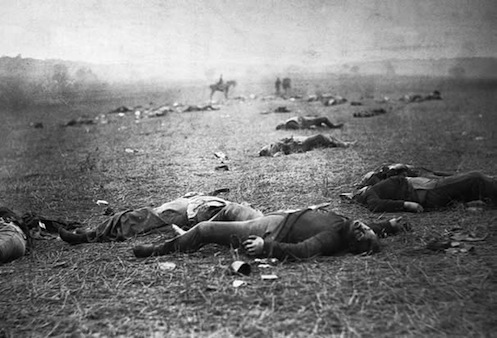History's Gettysburg graces Memorial Day with a vivid recreation of a pivotal Civil War battle
05/27/11 01:04 PM

By ED BARK
Brothers Ridley and Tony Scott are longtime purveyors of visceral, action-fueled entertainment, ranging from Ridley's Gladiator and Black Hawk Down to Tony's The Taking of Pelham 1 2 3 and Man on Fire.
They've also lately collaborated on calmer TV dramas, co-producing Numb3rs and The Good Wife for CBS.
Gettysburg, the Memorial Day centerpiece of History's "Civil War Week," is more in keeping with what the Scotts tend to do best. It's an effectively communicated, visually impressive "war is hell" docudrama with an advisory that "some scenes in this program may disturb viewers."
Premiering Monday at 8 p.m. (central), the two-hour presentation can be a little over-cooked at times. But not to the point of compromising its overall impact. Uncredited actors play several of the soldiers spotlighted in Gettysburg, but only one of them has any directly spoken dialogue. And that's just a single sentence from Union Army Lt. Col. Rufus Dawes, who commands, "Throw down your muskets" after a bloody skirmish with the Confederates.
Gettysburg otherwise is largely vocalized by narrator Sam Rockwell, an accomplished actor who will share the screen with Harrison Ford and Daniel Craig in this summer's heavily promoted Cowboys & Aliens. A mix of talking-head historians also parades through, with some of the soldiers' written remembrances of the Civil War voiced off-screen.
The pivotal battle of Gettysburg -- "Two American armies face off in a small Pennsylvania farm town" -- unfolded from July 1 to July 4, 1863. The film compellingly and informatively recaptures the carnage while also going a bit Nova on occasion with explanations and illustrations of the damage that could be inflicted by a "mini-ball bullet" or a well-placed cannon shot. Troop movements and strategies are also well-explained.
The human cost of war is paramount, though. And the up-close stories of Union Sgt. Amos Humiston and Confederate private Ridgeley Howard are particularly affecting. One survives and one does not. Each suffers multiple combat wounds, with the camera closing in to capture both their sufferings and their longings.
The battle scenes and costuming are by and large remarkable. There are no pretty boy soldier here. Instead they're bloodied, dirt-stained and usually sporting scraggly beards. Gettysburg intimately touches on some of their stories while also offering scope aplenty and gunfire to burn. We also learn that an average amputation during the Civil War took 12 minutes, with pretty good odds -- 77 percent -- of surviving with one arm extracted.
Some of the historians can get a little carried away, as when one of them says, "The level of courage is intense and large" on the part of Rebel soldiers steadfastly advancing into heavy artillery fire. Rockwell's narration is solid enough, though not exceptional.
Gettysburg is uniformly powerful, though, with a wealth of well-placed anecdotal information joining forces with the center-stage combat. Ken Burns' The Civil War remains an unequalled benchmark. But the Scotts have made a strong case for at least being included in the conversation.
GRADE: A-minus
